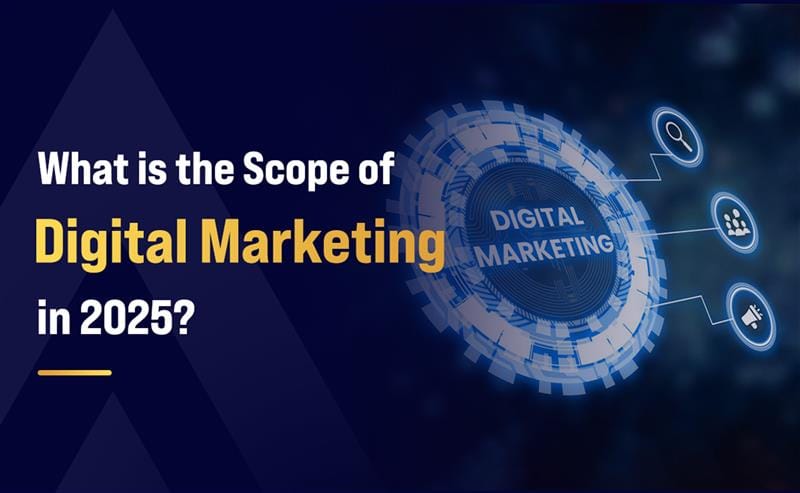In the era of smartphones, social media, and online transactions, the scope of digital marketing is broader than ever. From small businesses to multinational corporations, every organization now understands the importance of maintaining a strong online presence. As consumers increasingly shift to digital platforms, digital marketing has become one of the most powerful tools for engaging audiences, building brand awareness, and driving sales.
In this comprehensive guide, we’ll explore what digital marketing is, examine the scope of digital marketing in today’s business environment, analyze trends and career opportunities, and understand how it’s reshaping industries across the globe.

Table of Contents
- What is Digital Marketing?
- Evolution of Digital Marketing
- Why Digital Marketing Matters
- Components of Digital Marketing
- The Scope of Digital Marketing in 2025 and Beyond
- Industry-Wise Application of Digital Marketing
- Digital Marketing Trends to Watch
- Career Scope in Digital Marketing
- Challenges in Digital Marketing
- Future of Digital Marketing
- Conclusion
1. What is Digital Marketing?
Digital marketing refers to all marketing efforts that use the internet or an electronic device. Businesses leverage digital channels such as search engines, social media, email, websites, and mobile apps to connect with current and prospective customers.
It includes both paid and organic strategies aimed at promoting products or services online. Unlike traditional marketing, digital marketing is data-driven, interactive, and measurable—making it more efficient and impactful.
2. Evolution of Scope of Digital Marketing
The scope of digital marketing has expanded dramatically over the past two decades:
- 1990s: Email marketing and static websites marked the dawn of digital marketing.
- 2000s: The rise of Google and SEO revolutionized online marketing.
- 2010s: Social media platforms like Facebook, Instagram, and YouTube reshaped customer interaction.
- 2020s: AI, automation, voice search, influencer marketing, and data analytics have become mainstream.
With technology evolving rapidly, digital marketing continues to transform how brands reach and convert customers.
3. Why Digital Marketing Matters
Digital marketing has become indispensable for several reasons:
- Global Reach: Businesses can reach global audiences with minimal investment.
- Cost-Effective: It offers better ROI compared to traditional advertising.
- Measurable Results: Analytics tools help track user behavior and campaign performance.
- Targeted Campaigns: Allows businesses to segment audiences and personalize messages.
- Real-Time Interaction: Enables instant customer engagement via chatbots, social media, etc.
Given these advantages, the scope of digital marketing is only set to grow.
4. Components of Scope of Digital Marketing
Understanding the key elements helps us grasp the full scope of digital marketing:
a. Search Engine Optimization (SEO)
SEO involves optimizing a website to rank higher on search engines like Google. It includes keyword research, on-page SEO, off-page SEO, and technical SEO.
b. Content Marketing
Creating valuable, relevant content to attract and retain an audience. Formats include blogs, articles, videos, infographics, and podcasts.
c. Social Media Marketing
Using platforms like Facebook, Instagram, Twitter, LinkedIn, and TikTok to build brand awareness and engage with audiences.
d. Pay-Per-Click Advertising (PPC)
Paid advertising through Google Ads, Bing Ads, or social media ads to drive immediate traffic.
e. Email Marketing
Sending targeted emails to promote products, offer discounts, or nurture leads.
f. Influencer Marketing
Collaborating with influencers to promote your brand to their followers.
g. Affiliate Marketing
Earning commissions by promoting other businesses’ products through unique referral links.
h. Mobile Marketing
Targeting users on smartphones via SMS, mobile apps, or responsive websites.
i. Video Marketing
Using videos on platforms like YouTube and social media for education, entertainment, or product demos.
j. Analytics and Data-Driven Marketing
Using tools like Google Analytics, HubSpot, and SEMrush to gather and act on customer data.

5. The Scope of Digital Marketing in 2025 and Beyond
As we move into an increasingly digital-first world, the scope of digital marketing is expanding across sectors and geographies. Here are a few key dimensions:
a. E-commerce Growth
The rise of online shopping has fueled demand for digital marketing strategies that enhance user experience, drive conversions, and increase repeat purchases.
b. Voice Search and AI Integration Scope of Digital Marketing
With smart speakers and voice assistants gaining popularity, optimizing for voice search is becoming a new frontier.
c. Personalization and Automation
Using AI and machine learning to deliver personalized user experiences through automated email flows, chatbot responses, and tailored ads.
d. Remote Work and Virtual Events
The post-pandemic world has normalized virtual interactions, leading to greater reliance on digital platforms for events, meetings, and sales.
e. Globalization of Markets
Small businesses can now compete on a global scale, thanks to digital marketing tools that level the playing field.
6. Industry-Wise Application of Digital Marketing
The scope of digital marketing varies across industries:
a. Retail and E-commerce
Digital marketing drives traffic, improves user experience, and increases conversion rates via SEO, PPC, and social media.
b. Education
Online courses and e-learning platforms use content marketing, webinars, and influencer campaigns to reach students globally.
c. Healthcare
Hospitals and clinics use digital strategies to build trust, provide information, and attract patients via search and local SEO.
d. Real Estate
Agents use virtual tours, targeted ads, and email drip campaigns to nurture leads and close sales.
e. Finance
Banks and fintech companies use digital marketing for lead generation, app downloads, and brand awareness.
f. Travel and Hospitality
SEO, influencer marketing, and reviews help travel brands inspire and convert customers.
7. Scope of Digital Marketing Trends to Watch
To understand the dynamic scope of digital marketing, let’s explore current and upcoming trends:
- AI and Chatbots: Enhancing customer support and automating responses.
- Video-first Content: Short-form videos and live streaming dominate attention spans.
- Voice SEO: Optimizing for conversational queries.
- User-Generated Content: Building trust and authenticity.
- AR/VR Integration: Offering immersive brand experiences.
- Sustainability Messaging: Brands focusing on eco-conscious marketing.
- Zero-Click Searches: Optimizing for Google snippets and knowledge panels.
8. Career Scope in Digital Marketing
With businesses increasing digital budgets, the career scope of digital marketing is vast and diverse:
a. Job Roles in Digital Marketing
- Digital Marketing Manager
- SEO Specialist
- Content Strategist
- PPC Expert
- Social Media Manager
- Email Marketing Executive
- Analytics Manager
- Influencer Marketing Specialist
b. Freelancing and Consulting
Many digital marketers work independently, offering niche expertise to startups and small businesses.
c. Entrepreneurship
Knowledge of digital marketing allows individuals to start and grow their own ventures with limited capital.
d. Remote Opportunities
Digital roles are flexible and often remote-friendly, attracting talent from across the world.
9. Challenges in Digital Marketing
Despite its potential, digital marketing also comes with challenges:
- High Competition: Every brand is fighting for attention in a saturated digital space.
- Algorithm Changes: Frequent updates in social media and search engines affect visibility.
- Ad Fatigue: Users may ignore or block excessive advertising.
- Data Privacy Regulations: Compliance with laws like GDPR is essential.
- Technical Skills Gap: Continuous learning is necessary to keep up.
However, with the right strategy and tools, these challenges can be navigated effectively.
10. Future of Scope of Digital Marketing
The future of digital marketing is full of possibilities:
- Hyper-Personalization: AI will enable tailored experiences at scale.
- Omnichannel Marketing: Integrating various platforms to create seamless user journeys.
- Blockchain in Marketing: Enhancing transparency in ad spend and data usage.
- Sustainable Marketing: Ethical branding will gain prominence.
- Metaverse Marketing: Brands will explore immersive virtual environments.
As technology advances, the scope of digital marketing will only continue to broaden, touching every facet of life and commerce.
11. Conclusion
The scope of digital marketing is vast, dynamic, and ever-expanding. From helping businesses grow online to offering lucrative career paths and shaping the future of communication, digital marketing is more than just a trend—it’s a fundamental shift in how we connect, engage, and transact in the digital age.
Whether you’re a business owner, student, or aspiring marketer, understanding the scope of digital marketing equips you to leverage opportunities, stay competitive, and succeed in a rapidly evolving digital landscape.
